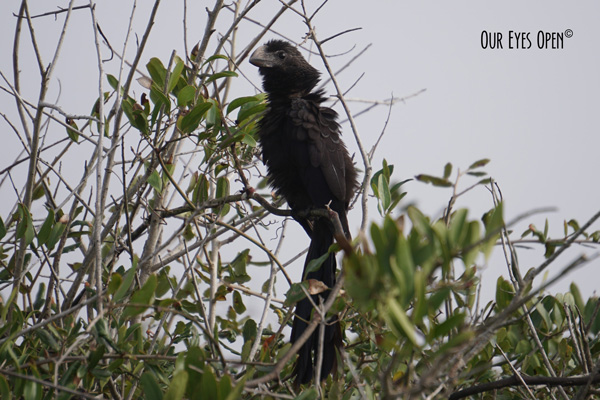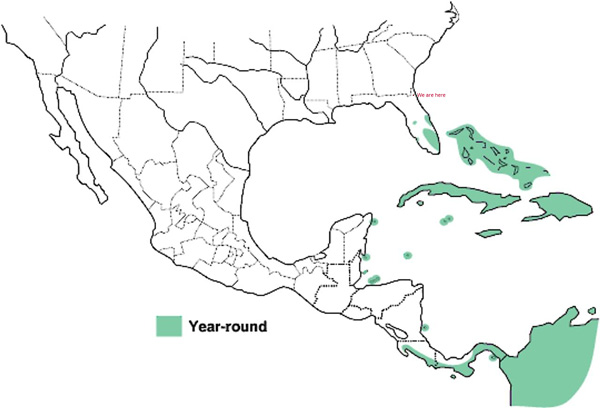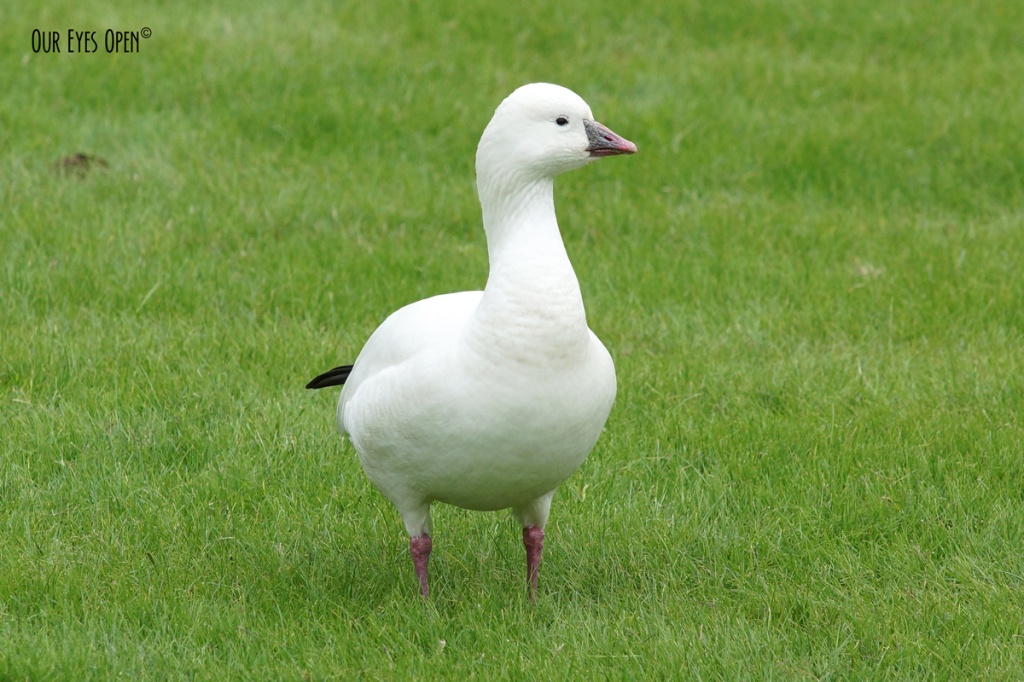Welcome to Week #11 of the Bird Weekly Photo Challenge. Week #11 challenge is Rare Birds for your area. This doesn’t have to be in your local area but in the general vicinity. I will be sharing birds that are rare in the area they were seen & captured with my camera in Florida.
Upcoming challenges can be found on my Bird Weekly Challenge Page.
The feature image is Ross’s Goose who showed up in Jacksonville with a flock of Canada Geese. Didn’t stay but for a few weeks and hasn’t been seen here again.
A rare bird is considered a species of bird that is almost never seen in an area to which it normally exists in habitat or migration.
Frank and I actually go birding, count species and log them on ebird.org. This information goes to The Cornell Lab of Ornithology. We began doing this after see the movie, “The Big Year“. Once I saw this fictional tale, I knew it was what I was meant to do. One day, I hope to do my own big year…maybe not as competitively, but it is a dream of mine to travel the US for a full year to see as many bird species in a year that I can.
Snowy Owl

3rd Time Spotted in the State of Florida and first time since 1999
The Snowy Owl is the largest in weight of all the North American owls. This is a most unpredictable bird of prey that will remain on its breeding grounds in the arctic in some years, while other years they will migrate to southern Canada and the northern U.S. In December, 2013, I was spending Christmas with my kids, grandkids and best friend down in Tampa. My BFF’s husband was reading the paper and saw a side column article about a rare bird seen at Little Talbot Island State Park in Jacksonville, the Snowy Owl. I was like, “What?” He showed me the article. I grabbed my cell phone & called Frank who had stayed in Jacksonville because his brother was visiting from Baltimore. Frank called the park ranger and sure enough it was confirmed the owl was there. Frank went out there that day. The location was easy enough to find. Follow the photographers from all over the world to see this rarity. Once I returned home, we took a trip out to the beach on January 3, 2014. Again, we followed the trail of photographers with their monster 600mm lenses mounted to professional tripods. With a great deal of enthusiasm, I could now say I had seen the elusive Snowy Owl. Here is an article from ameliaislandliving.com about the Snowy Owl.

Harlequin Duck

On the day that we were on the beach with mouths open in awe of the Snowy Owl, there was chatter amongst the photographers that there was another rare bird in Northeast Florida that could be found at Fort Clinch State Park in Fernandina Beach. Only another 26 miles north and another state park that we favored. We headed to Fort Clinch and again, photographers were everywhere. We headed to the pier where the last known location was of the Harlequin Duck. There he was. He must have entertained us for at least an hour. Interesting fact about this waterfowl is they suffer more broken bones than any other species. I can understand why while watching this bird jump off the slippery rocks into the water, sometimes landing on more rock. Clumsy or Daredevil???

By the way, the Fort Clinch Pier that I mentioned no longer exists. The pier was the longest pier in the state of Florida at 2409 feet. It was compromised by Hurricane Matthew in 2016 and no longer exists. It is certainly missed when we take day trips out there. Article about the demolition.
Smooth-billed Ani

The Smooth-billed Ani is in the Cuckoo family. It has a glossy black exterior all over. Typically, they are found in South America & the Caribbean. There is a small & declining population in Florida, but mostly the southern part around Ft. Lauderdale & Miami. This bird made it all the way to Jacksonville and spent several weeks at Little Talbot Island State Park at the end of 2018 & beginning of 2019. Happy New Year to us! They eat insects & lizards and like the shrubby habitats, if you couldn’t tell. An interesting feature to this bird is they have two toes pointing forward and two toes pointing backwards. This is called “zygodactyl”. Prehistoric sounding to me! We think this one got lost because they live in small groups of 1-5 breeding pairs and up to 17 individuals at a time. All the females lay their eggs in one communal nest and then entire group incubate the eggs and take care of the young. When these Anis forage, one member will sit high on a perch as a lookout, like the one above. Guard duty at its best!

American Flamingo

I know this guy has made an appearance several times in the blogs, but this is one of the rarest things in Florida. Most people associate flamingos with Florida culture. Plastic pink flamingos are easily spotted in many a resident’s yard. However, in most cases if you want to see the American Flamingo in Florida, you must travel south to Everglades National Park or you might get lucky in the Florida Keys. This sole flamingo has been living in the St. Marks Wildlife Refuge near Tallahassee, Florida since Hurricane Michael and is believed to have got caught up in the storm and has now made this awesome habitat…HOME. On our next trip over there, I’m hoping to get a better photo. If I do, this bird will be a blogging diva!
Ross’s Goose

Ross’s Goose is a version of the familiar Snow Goose and breeds solely in Canada. This goose migrates into the US & Mexico. It is uncommon for this goose to migrate to Florida, but this guy flew in with a flock of Canada Geese a few years ago and was spotted at the University of North Florida (UNF). Their breeding grounds are at risk due to climate change as the snow cover is reduced. When they do breed, the female does all the incubation while the male stays close, guarding her the whole time. She will cover the eggs with down when she leaves the nest which keeps them warm & protected from predators. They only have one brood per year, 2-6 eggs per clutch & incubate in 19-25 days. The chicks leave the nest within 24 hours of hatching & have the ability to swim & feed. Pretty cool duck, if you ask me!

Until next week…Week #12 – Seagulls



Comments
32 responses to “Bird Weekly – Photo Challenge – Rare Birds”
Great shots! The Harlequin Duck certainly looks like a daredevil to me 😀
LikeLiked by 1 person
Thank you Dora! It was amazing to watch this guy climb all over the rocks and then jump into the water. Timing it just right for the tide as it was coming in or he would have hit the sand. Yes, daredevil! 🙂
LikeLiked by 2 people
Fabulous sightings, Lisa!
LikeLiked by 1 person
Thank you Cathy! 🙂 I had more that I forgot about but I wasn’t going back in to redo anything after I posted it this morning.
LikeLiked by 2 people
I know the feeling! I did that with the birds of prey…forgot I had a couple of adult peregrines!
LikeLiked by 1 person
Well, it will come around again at some point. I’ve done it several times, but tend to use my newest photos most of the time. 😊
LikeLiked by 1 person
Wow a Flamingo! These are all wonderful sightings and beautiful captures.
LikeLiked by 1 person
Thanks Beth. Maybe when things get back to normal, y’all might want to take your RV over there. There is a campsite right at the entrance to Lighthouse Drive which goes into the park. As far as I know, that Flamingo is still there. 🙂
LikeLiked by 2 people
lovely collection! i’m learning a lot about birds. thank you! 🙂
LikeLiked by 2 people
I’m happy that you are enjoying it. I figure just a few tidbits and no one is brain dead by the time they finish reading. LOL! 🙂
LikeLike
What a great variety of rare birds you’ve seen!! I’d love to see them all.
LikeLiked by 2 people
Well, they are no longer in Florida except the Flamingo…I hope! Better to find them where they are than where they are not. 🙂
LikeLiked by 1 person
Fantastic sightings and photos, Lisa. 😍 I’ve never seen any of these in my backyard. 😳
LikeLiked by 2 people
Thank you. I’ve never send them again in Florida. I did Ross’s goose in Las Vegas. It was only rare for here. 😊
LikeLiked by 1 person
Absolutely beautiful photos, Lisa! 🙂
LikeLiked by 1 person
Thank you so much! 😊
LikeLike
that is so cool that you have discovered such a passion, and that you are contributing to ebird.org
it’s amazing how quickly word must spread when there is a rare bird to be photographed!
great photos, as always…
LikeLiked by 1 person
[…] Bird Weekly’s challenge: Rare Birds. The featured image is a pair of wood ducks. While they did stick around and have babies in our […]
LikeLiked by 1 person
[…] BirdWeekly: Rare-Birds […]
LikeLiked by 1 person
Lovely captures n interesting info to go with… I’ve seen rare ones only in the zoos… 🙃
LikeLiked by 1 person
Well, you can post those this week if you have pics of them. I knew this would be a difficult challenge. 🙂
LikeLiked by 1 person
Sorry not rare but… https://myheart2heart.blog/2020/08/25/a-rare-one/
LikeLiked by 1 person
[…] Thanks you Lisa. for this challenge. Her original post is Bird Weekly Challenge #10 – Rare bird for your area […]
LikeLiked by 1 person
Here’s my entry https://wanderingdawgs.com/2020/08/24/bird-weekly-challenge-11-rare-bird-for-your-area/
LikeLike
[…] Posted for BIRD WEEKLY – PHOTO CHALLENGE […]
LikeLiked by 1 person
Here is my entry, only seen in a wetland centre but I do love them.
LikeLike
[…] Bird weekly […]
LikeLiked by 1 person
I love the Snowy Owl photo, and the Harlequin Duck sounds like he’d be great fun to watch!
LikeLiked by 1 person
I wished we had been closer and there were at least 100 people on the beach with a lot bigger lenses than ours. That is how rare that bird is. The Harlequin Duck was amazing. Little daredevil. Literally out there watching it for 2 or more hours. 🙂
LikeLiked by 1 person
You still have a great photo – it’s nice to see him in his surroundings like this 🙂
LikeLiked by 1 person
Thanks! It was one of the coolest bird moments we’ve ever had and we have had plenty. 🙂
LikeLiked by 1 person
Meanwhile there is much ‘rare bird’ excitement in the UK this week: https://www.bbc.co.uk/newsround/57495817
LikeLike